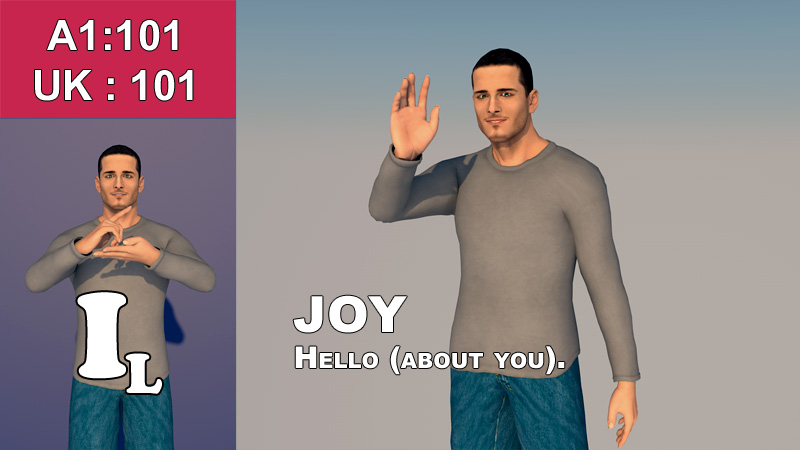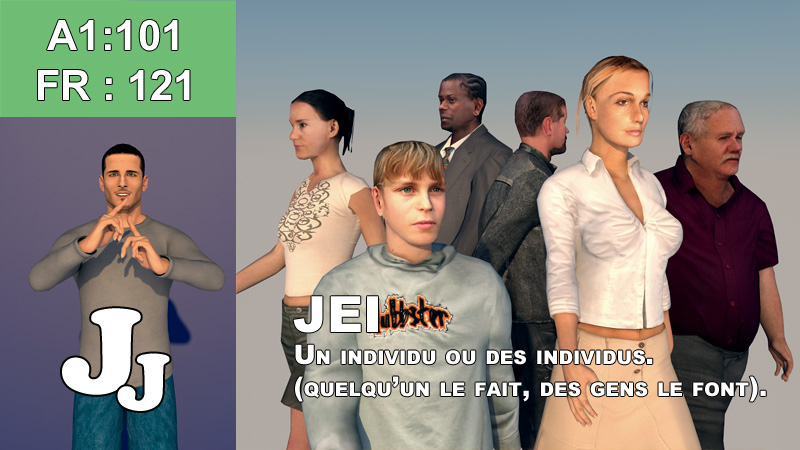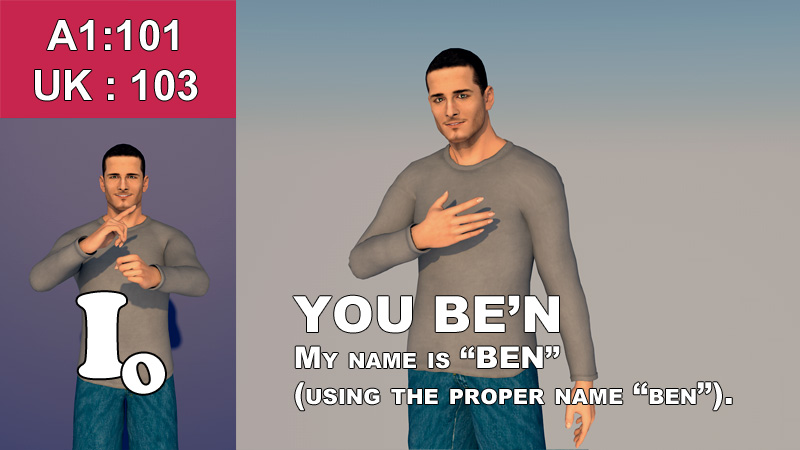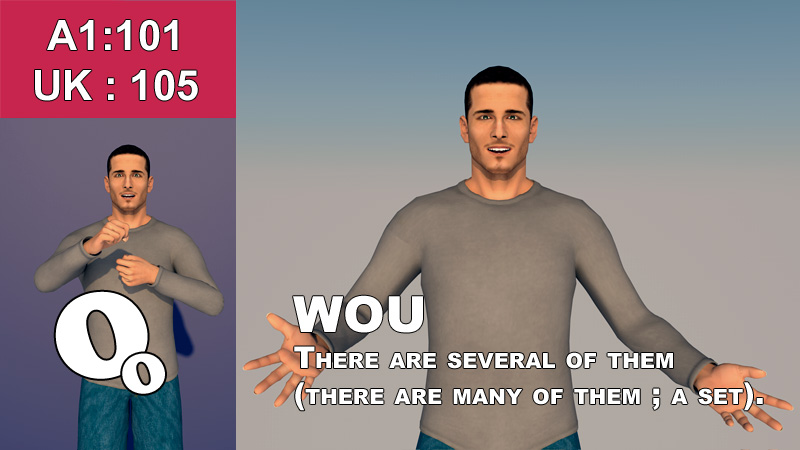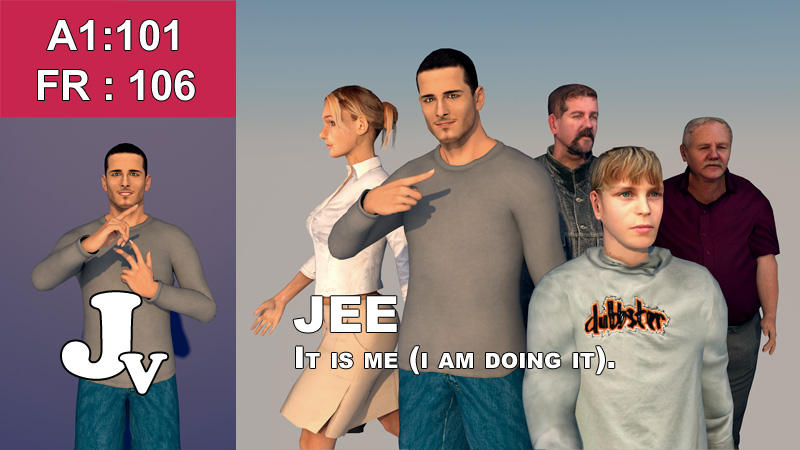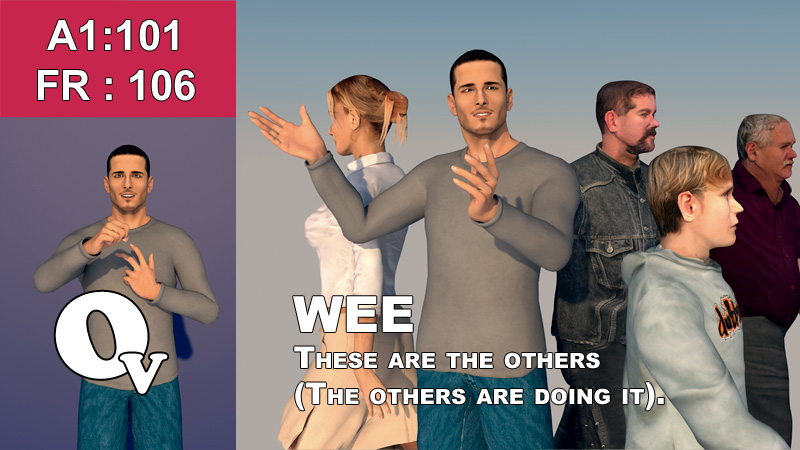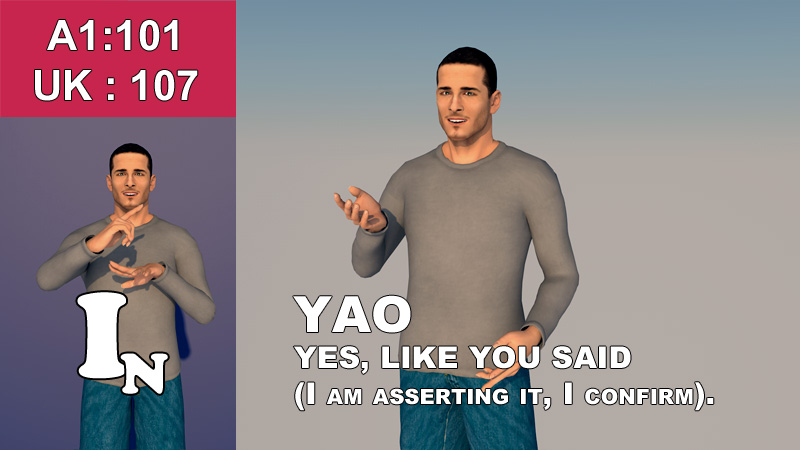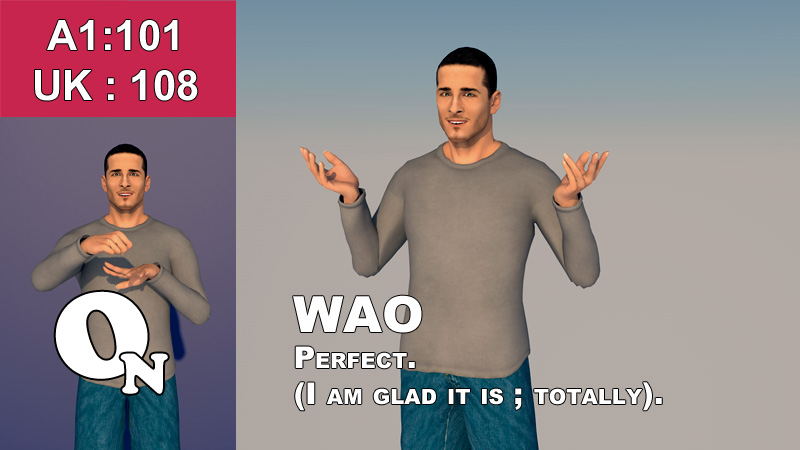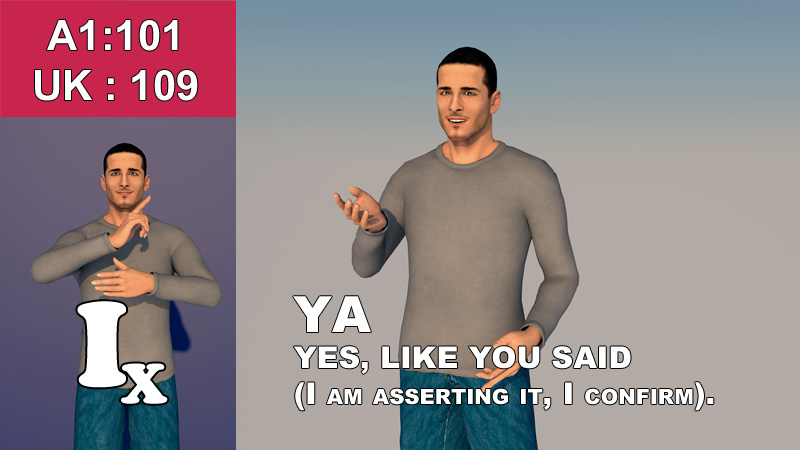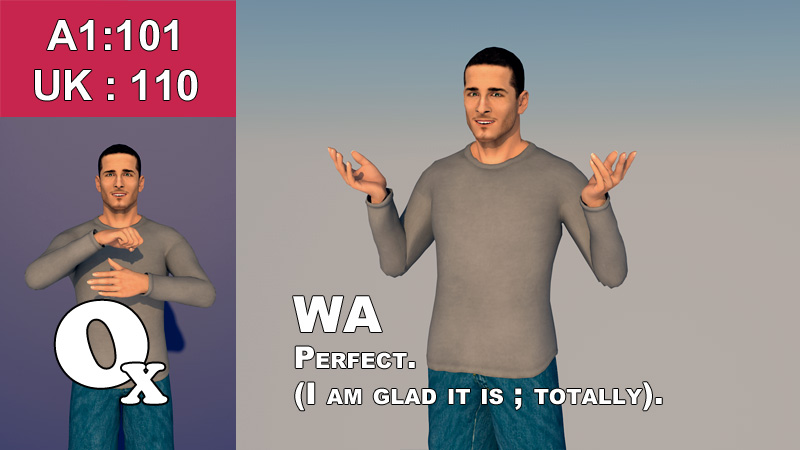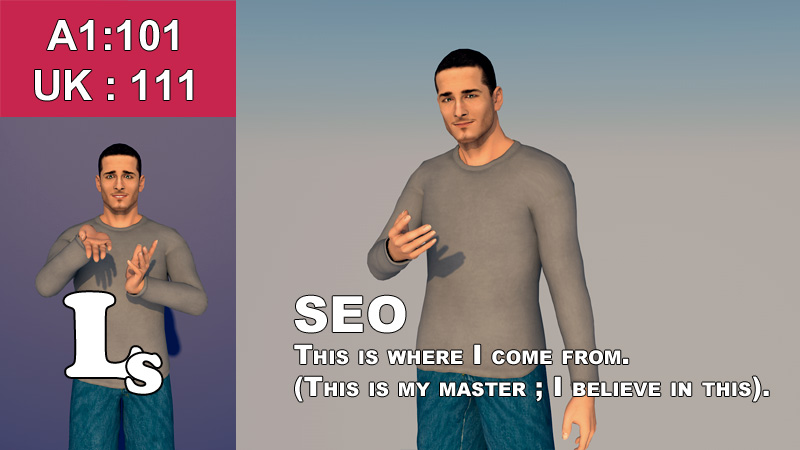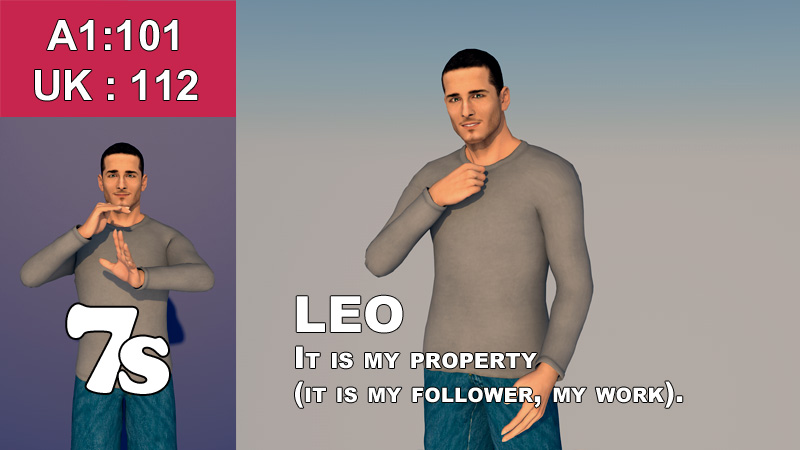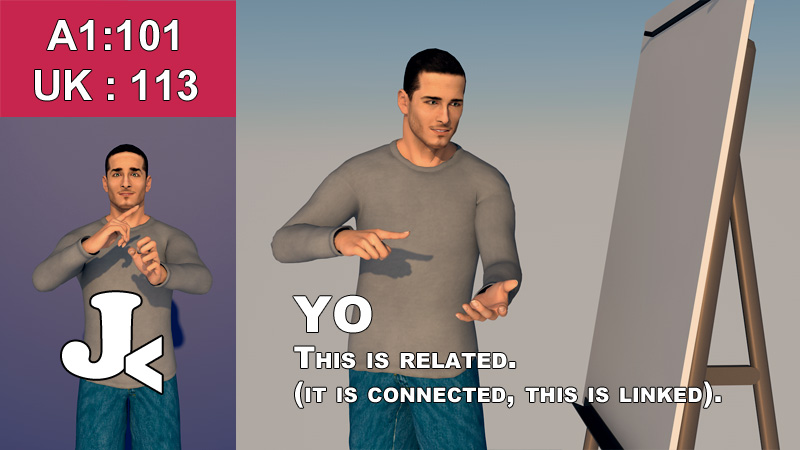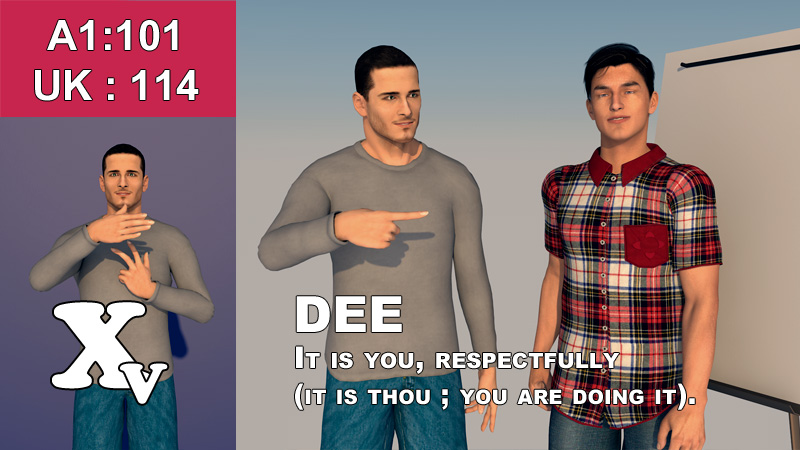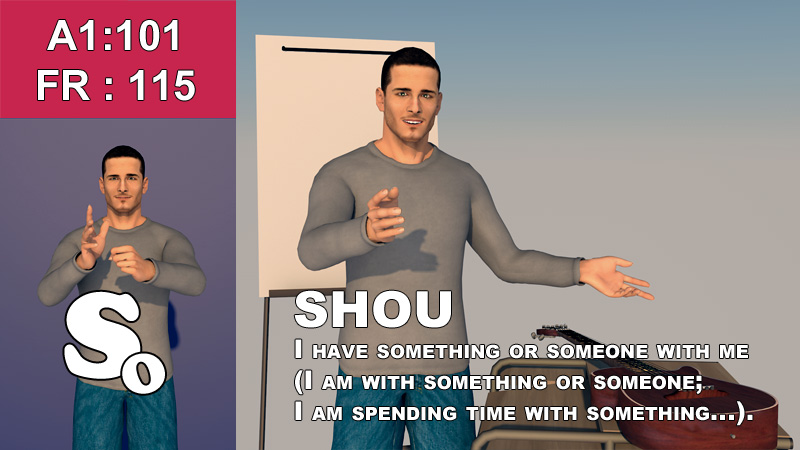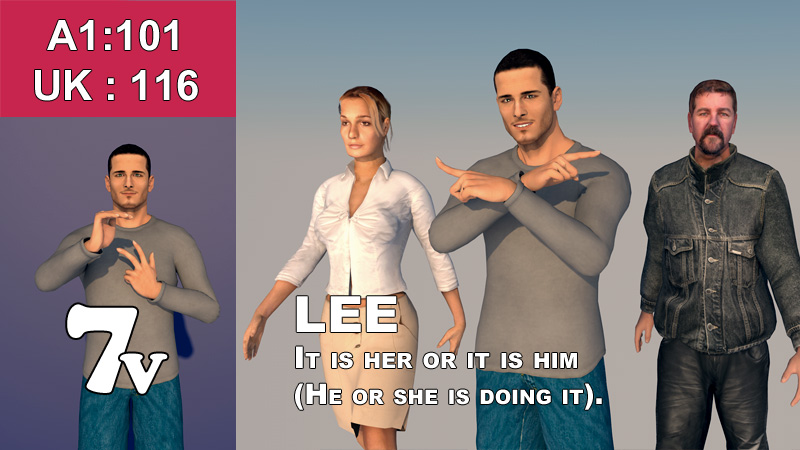ECRITURE - SCIENCE-FICTION - LANGUES - MUSIQUE - BLU-RAY - LIENS
REMAI A1 : Unit 101 - English Version
Ici la version française
LÂTINÊ TRANSLÂTIO
***
Work in progress.
***
INTRODUCTION
French version here.
LÂTINÊ TRANSLÂTIO
***
Welcome to this light-speed course of Reymy.
Reymy is a language created by David Sice. It has remarkable creative properties and can be transmitted by any twelve signs that can at least be paired.
This light-speed course allows to acquire a European A1-level of language proficiency and above in about an hour. This course can be followed in French and in English, and also in Latin and Japanese as experimentation.
Please read aloud the Reymy words, and if your hands are free, sign the corresponding syllables as you pronounce them, one hand above the other. If you are sitting at a table, the hand closer to you should stand for the lower hand when signing while standing.
***
LEARNING UNIT 101 - GREAT BEGINNER
Ici la version française.
LÂTINÊ TRANSLÂTIO
***
This first unit is approximately three minutes-long and covers roughly a three-hour course of English as a Foreign Language for great beginners.
Don't worry if you can't memorize everything at first. You won't need to go back to the previous unit in order to study the next. You do need to sleep and to practice in order to speak fluently.
To practice the language, you can use the conversational unit with the same number as the learning unit. For example, Conversational A1 101 corresponds to Learning A1 101.
***
Find Conversational A1 101 here.
***
Find Learning Unit 102 // counting and buying // here.
The five-minutes long unit 102 allows you to count up to billions of billions perform basic calculations; roughly describe merchandise, sell and buy.
***
CHAPTER ONE : OY-FLAGS
***
In Reymy, one syllable (a consonant plus a vowel) makes a full word, and one word makes a full sentence. The vowel tells the grammatical class of the word. The consonant tells the meaning of the word in the context of a grammatical class.
YOY ends with OY (like "Toy"). Therefore it is a grammatical flag. YOY can also be pronounced JOY (like "joy"), with the exact same meaning.
***
If the OY-Flag is the only word of the sentence, it is a set-point or an invitation.
When opening a conversation, YOY or JOY is used to salute an interlocutor. In the middle of a conversation, the same words are used to hail one's interlocutor, i.e. warning him that he's the one that is speaking to.
***
HELLO AND WELCOME
WOY JOY ! (« woy joy ») – Welcome and hello (join me, it's about you).
***
CHAPTER 2 : PROPER NAMES YOU
ici la version française.
LÂTINÊ TRANSLÂTIO
OU-words are modes. Modes are mostly like adjectives. YOU is the mode of the proper names.
In Reymy, words are defined by the signs (thus the syllables) that compose them. It is not true for the proper names, like people's name, countries name, and cities name and so on. Therefore, in order to use proper names in Reymy sentences, one have to say YOU (like "you") first, then the proper name, then adds a 'N which indicates the end of the proper name. Any vowel can be added before 'N in order to facilitate the pronunciation of the sentence.
***
WOU is also a mode, indicating the number of instances of the following objet. Placed before YOU, WOU indicates that several individual or things are named after the same proper name.
WOU YOU BE’N – Several "Ben" (many people named "Ben").
***
NAMES OF COUNTRIES, NAMES OF TOWNS
Proper names are always pronounced as close as possible to their original pronunciation.
YOU FRANS’EN SEI – (The country of) France.
YOU PARI’IN SEITA – (The city of) Paris.
***
When the proper name ends with a vowel and an N, this part of the name can be cut and replaced with the Reymy Closing that sounds the same.
YOU BRIT’EN SEI – (The country of) Great-Britain.
YOU LONDO’N SEITA – (The city of) London.
YOU NIHO’N SEI – (The country of) Japan.
YOU TOOKYO’ON SEITA – (The city of) Tokyo.
***
When the name of a country or a city includes a part that means "country" or "city", this part of the proper name is cut a replaced with 'NSEI (country) or 'NSEITA (city).
YOU ES'ENSEI – (The country of the) United States Of America.
YOU WASHI’N SEITA – (The city of) Washington.
***
CHAPTER 3 : I-PERSONS
Ici la version française.
LÂTINÊ TRANSLÂTIO
***
I-Persons evoke people that can or cannot take part in the conversation in progress. JEE (like "Djinn") points to the person who is talking.
I-Persons belongs the Referent's grammatical family of classes. These words are called Referents because they refers to what is happening around the conversation's actual place, instead of evoking what is happening in the story that people are talking about.
***
I-Persons do not only evoke people: they also indicates if the speaker or the listener is supposed to know the people they are talking about, and if they are talking about with respect, informally (meaning like living in the same room) or with a distant tone (with a cold attitude). I-persons also tell if one is talking about one particular individual, a group of individual or no individual at all.
WEE or OY WEE evoke other people, meaning several individual that are not the speaker or the listener. Therefore WEE indicates a group of distant persons.
***
MY NAME IS...
JEE YOU… ‘N – My name is…
My name is Mark – JEE YOU MARK EN.
DEE YOU…’N – Your name is…
Your name is Maria – DEE YOU MARIA EN.
***
CHAPTER 5 : AO-CONCLUSIONS
Ici la version française.
LÂTINÊ TRANSLÂTIO
***
AO-Conclusions mark the end of a sentence, like English punctuations. YAO is the positive full-stop. It allows the speaker to assert what has just been said, or to confirm what someone else just said.
***
AO-conclusions are not mandatory. In an oral conversation, the tone of the voice can provide sufficient information about your opinion about what has just been said or heard. WAO is the rejoicing or abounding full-stop. It is used to mark enthusiasm, good feeling or gratefulness about what has just been said.
***
DELIGHTED
YOY. JEE YOU MYK EN YAO – Hello, my name is Mike.
WAO. JEE YOU ALEX ANYAO – Delighted. My name is Alex.
***
CHAPTER 5 : A-OPINIONS
Ici la version française.
LÂTINÊ TRANSLÂTIO
***
A-Opinions indicate what the speaker or the listener or someone else is thinking about the next object in the sentence. Like I-persons, A-opinions belong to the Referents grammatical family. Therefore, A-Opinions are about what is happening around the conversation, not about the story told by the sentence.
YA or JA (« dja ») asserts or confirms that we are indeed talking about an object of one sort, or that this objet is the very same objet of the same sort that has been quoted before.
***
A-Opinions are very close to AO-Conclusions, except that AO-conclusions comment about the sentence they are closing, while A-Opinions comment only about the next word (syllable) in the sentence. Therefore, if YA is the only word of a sentence, it means YAO. Likewise, when WA is the only word of the sentence, it means WAO.
***
IN MY OPINION, IN YOUR OPINION
When an I-Person stands before an A-Opinion, it indicates who is commenting.
JEE YA – I am asserting it; I am confirming it.
DEE YA – You are asserting it; you are confirming it.
JEE WA – I am glad it is; I am welcoming it.
DEE WA – You are glad it is; you are welcoming it.
***
CHAPTER 6 : SEO ORIGIN
Ici la version française.
LÂTINÊ TRANSLÂTIO
***
SEO (« sey-o ») indicates a strong feeling of belonging, introducing the cause or the origin of the word quoted before. Therefore it can be used to evoke religious, ideological or moral stands.
EO-Words are Operators - meaning words that link the word before with the next. Once linked, the three words are fused into one object evoked in the story told by the sentence, or into one commentary that adds information about the objects of the story.
***
EO ("ey-o") can also be pronounced EU ("err"), U (from the French word "Lune") or EOU ("ey-ou"), depending on what is the easiest way for you.
LEO ("ley-o") indicates the thing that someone owns (as in the landlord owns the house), has created, has caused, has inspired or is leading. LEO is symmetrical to SEO.
***
MY CITIZENSHIP IS...
If you think of the origin first, add LEO to it, and then the I-Person.
If the person comes to you mind first, you add SEO to it, and then the origin.
JEE SEO YOU FRANS’EN – I am French.
YOU FRANS’EN LEOJEE – I am French.
JEE SEO YOU BRIT’EN – I am British.
YOU BRIT’EN LEOJEE – I am British.
JEE SEO YOU NI-HO’N – I am Japanese.
YOU NI-HO’N LEOJEE – I am Japanese.
***
MY RELIGION IS...
SEO can be used as the verb "to follow" (a leader, a prophet) or as the verb "to believe" (in a principle, a faith, and an ideal). Therefore, when the name of the one you are following or in whom you believe comes to your mind first, add LEO and the I-Person. If you think of the person first, add SEO and then the name of the leader or the name of the ideology that that person is following.
JEE SEO YOU KRIST’AN – I am a Christian.
YOU KRIST’AN LEOJEE – I am a Christian.
JEE SEO YOU MAH’AMED’AN – I am a Muslim.
YOU MAH’AMED’AN LEOJEE – I am a Muslim.
JEE SEO YOU AVRAHAM’AN – I am Jewish.
YOU AVRAHAM’AN LEOJEE – I am Jewish.
JEE SEO YOU BOUD’H’AN – I am a Buddhist.
YOU BOUD’H’AN LEOJEE – I am a Buddhist.
***
CHAPTER 7 : YOJEE'N POSSESSIVE
Ici la version française.
LÂTINÊ TRANSLÂTIO
***
In order to mention something that has a connection with oneself, one use YOJEE'N. YO is an O-Operner. It introduces an explanation; JEE means "me". Therefore YOJEE'N means literally "mine", "from me", or "about me". 'N marks the explanation's end.
***
The DEE-Person indicates respectfully to whom one is speaking. It is a polite and friendly way to address somebody that you know (meaning somebody you have been introduced to).
***
IT IS MINE, IT IS YOURS
YOJEE’N – It is mine (it is connected to me).
YODEE’N – It is yours (it is connected to you).
YOWEE’N – It belongs to someone else (it is connected to someone else).
YO YOU JEREMI’NN – It is Jeremy's (it is connected to someone named "Jeremy").
YO YOU BE’NN – It is Ben's (it is connected to someone named "Ben").
***
CHAPITRE 8 : LE VERBE "AVOIR / ÊTRE AVEC" SHOU
Ici la version française.
LÂTINÊ TRANSLÂTIO
***
In Reymy, SHOU is not a verb, but an OU-Mode, meaning some kind of adjective. Nevertheless, SHOU followed by a syllable ending with an EE does read itself like an EE-Person. Then SHOU expresses a weak idea of possession, like in SHOUJI, "I have got something or someone with me" or in "something or someone belongs to some moment in my life".
***
LEE is the person that indicates the one that does not participate in the conversation, versus JEE, that indicates the speaker, and DEE, that indicates the listener. As WEE (the others), LEE is a distant person, meaning an EE-person that one uses to describe someone that the speaker or the listener does not know or does not want to know. It is a rather cold way of speaking about someone that usually is not there.
***
The object that is with someone comes after SHOU in the sentence, as in SHOUJEE YOU JEREMI'N - I am with Jeremy (I have got Jeremy with me) - or in SHOUDEE YOU BE'N - You are with Ben (You've got Ben with you).
SHOUJEE has a much weaker sense than SEOJEE ("I am the master or the creator of something or somebody").
But YOJEE'N is the weakest possessive of all, because it indicates solely a link between the EE-person (in fact any part that the EE person could play in the definition of the word before the O-Opener), not the weight of a thing in a person's life.
***
CONJUGATE THE VERB "TO HAVE (GOT)" / TO BE WITH"
I have got (there is with me) - SHOUJI.
You have got (there is with you) - SHOU WE.
He or she has got (there is with him or with her) - SHOULI.
The others have got (there is among the others) - SHOUWI.
***
***Work in progress***
***
DROITS
La totalité des cours de rémaï 36 (illustrations visuelles ou sonores comprises) a été créée par David Sicé de 2007 à 2012. Celui-ci a placé ces contenus sous licence Creative Commons Attribution + Non Commerciale + Non Dérivative : Il est donc permis de reproduire ce qui suit dans un but non commercial, sans l'adapter et sous réserve de rappeler que l'auteur en est David Sicé. Il est interdit de reproduire, d'utiliser ou d'adapter ce qui suit pour en faire un usage commerciale sans autorisation écrite de David Sicé. Il est interdit d'adapter ou de modifier ce qui suit, même dans un but non commercial sans autorisation écrite de David Sicé.
***
